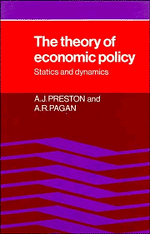Book contents
- Frontmatter
- Contents
- Preface
- Part I The static theory of policy
- Part II Dynamic fixed objectives: on hitting points and paths
- 4 The dynamic policy problem: models and objectives
- 5 Controllability properties of dynamic policy models
- 6 Observability properties of dynamic policy models
- 7 The dynamic theory of stationarity objectives
- 8 The dynamic theory of path objectives
- 9 Policy design for path objectives
- 10 Rational expectations and the theory of policy
- Part III Dynamic flexible objectives: on tracking points and paths
- References
- Index
10 - Rational expectations and the theory of policy
Published online by Cambridge University Press: 05 November 2011
- Frontmatter
- Contents
- Preface
- Part I The static theory of policy
- Part II Dynamic fixed objectives: on hitting points and paths
- 4 The dynamic policy problem: models and objectives
- 5 Controllability properties of dynamic policy models
- 6 Observability properties of dynamic policy models
- 7 The dynamic theory of stationarity objectives
- 8 The dynamic theory of path objectives
- 9 Policy design for path objectives
- 10 Rational expectations and the theory of policy
- Part III Dynamic flexible objectives: on tracking points and paths
- References
- Index
Summary
Introduction
The framework set out in earlier chapters has basically extended and embroidered the approach to the analysis of policy in Tinbergen's pioneering work (1963). Central to each chapter however has been the presumption that there is a ‘policy invariant’ law of motion to the system (Prescott (1977)). This assumption came in for strong criticism during the early seventies, for example Lucas (1972), and its relaxation has led to models as in Sargent and Wallace (1975) in which (monetary) policy had no impact: no (monetary) policy existed to achieve a set of defined objectives as the private sector always offset government policy because of policy induced variation in their expectations.
This proposition, that rational expectations (REs) in a model can cause a failure of policy existence, has not been quietly accepted by the profession and there have grown up a number of counter-examples designed to show that policy may still exist even when agents do anticipate policy correctly – Fischer (1979), Buiter (1979), and Taylor (1979a). What seems lacking from this literature though is an abstract investigation into the consequences of REs for the theory of policy – only Turnovsky (1977) and Aoki and Canzoneri (1979) having attempted it – and yet there is a pressing need for this in the face of a continued proliferation of special models reaching contradictory conclusions. Therefore, this chapter aims to provide a generalised treatment of static and dynamic fixed target policy in linear models with REs.
- Type
- Chapter
- Information
- The Theory of Economic PolicyStatics and Dynamics, pp. 288 - 310Publisher: Cambridge University PressPrint publication year: 1982



